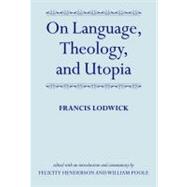- ISBN: 9780199225910 | 0199225915
- Cover: Hardcover
- Copyright: 4/15/2011
Francis Lodwick FRS (1619-94) was a prosperous merchant, bibliophile, writer, thinker, and member of the Royal Society. He wrote extensively on language, religion, and experimental philosophy, most of it too controversial to be safely published during his lifetime. This edition includes thefirst publication of his unorthodox religious works alongside groundbreaking writings on language. Following an extensive introduction by the editors the book is divided into three parts. Part One includes A Common Writing (1647), the first English attempt at an artificial language, and the equally pioneering phonetic alphabet set out in An Essay Towards an Universal Alphabet (1686). Part Twocontains a series of linked short treatises on the nature of religion and divine revelation, including 'Of the Word of God' and 'Of the Use of Reason in Religion', in which Lodwick argues for a new understanding of the Bible, advocates a rational approach to divine worship, and seeks to reinterpretreceived religion for an age of reason. The final part of the book contains his unpublished utopian fiction, A Country Not Named: here he creates a world to express his most firmly-held opinions on language and religion, and in which his utopians found a church that bans the Bible. The book givesnew insights into the religious aspects of the scientific revolution and throws fresh light on the early modern frame of mind. It is aimed at intellectual and cultural historians, historians of science and linguistics, and literary scholars - indeed, at all those interested in the interplay ofideas, language, and religion in seventeenth-century England






